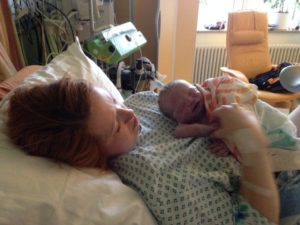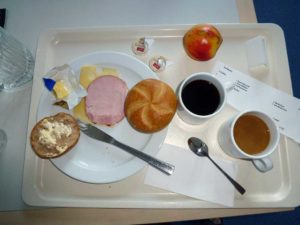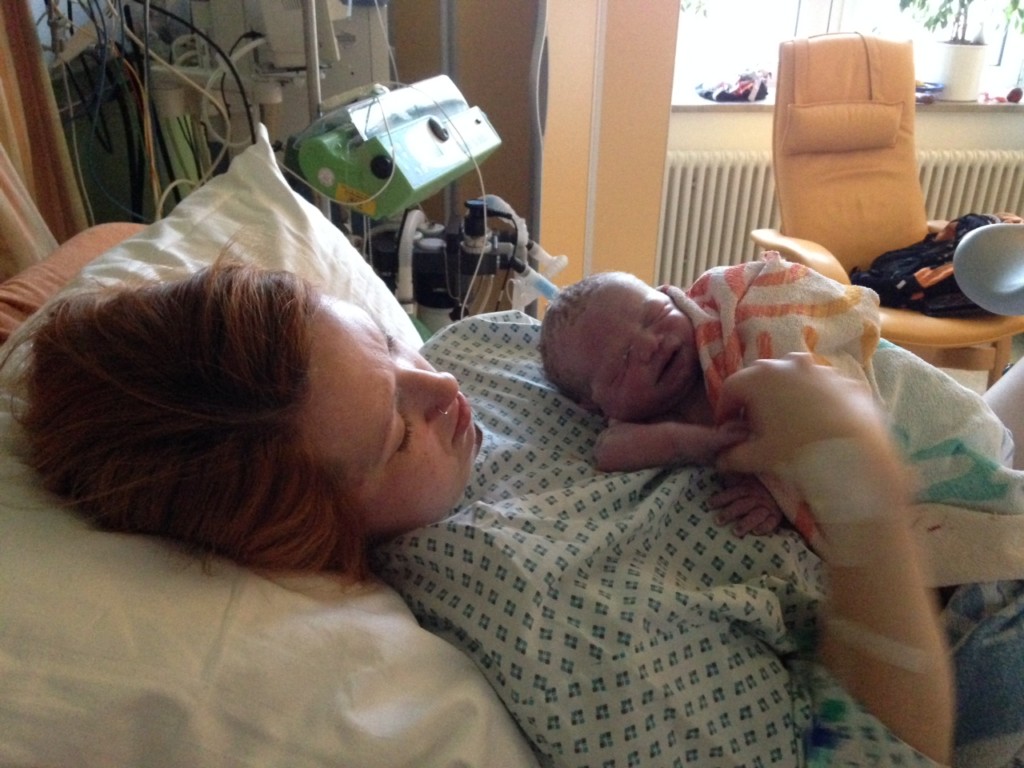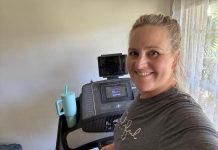 I had never planned to have children outside of the United States. The hope for an overseas assignment always seemed like a long shot for my husband’s career, and the thought of fighting a language barrier and different practices of medicine terrified me. Nevertheless, we decided to try for just one more child while living in Germany. I had plenty of friends who had delivered overseas and raved about German healthcare. We had been to our local klinikum or hospital twice already for the children (of course), and I felt confident that this would be a unique experience for us. I also had a deadline of no more pregnancies after turning 30 years old, so the clock was ticking!
I had never planned to have children outside of the United States. The hope for an overseas assignment always seemed like a long shot for my husband’s career, and the thought of fighting a language barrier and different practices of medicine terrified me. Nevertheless, we decided to try for just one more child while living in Germany. I had plenty of friends who had delivered overseas and raved about German healthcare. We had been to our local klinikum or hospital twice already for the children (of course), and I felt confident that this would be a unique experience for us. I also had a deadline of no more pregnancies after turning 30 years old, so the clock was ticking!
So what is it like to be pregnant and have a child in Germany? The experience really depends on where you are stationed and/or living and if your pregnancy requires more extensive medical care. If you happen to have an obstetrician and delivery unit on your base, congratulations! For me, I was directed to choose one of the local German hospitals and doctors. The first difference — my doctor was located in the same hospital that I delivered my baby. Every appointment, screening, lab test, and consultation was done at the Klinikum St. Marien in Amberg. There are other obstetricians and gynecologists who practice outside the hospital, but I liked this convenience. The “office” here was no more than a bathroom and a large exam room with two beds, sonogram equipment, and every other gynecological device necessary. No frills, no extra rooms or spaces. This was so inconspicuous that I was lost on my first appointment! I walked past it several times before realizing that this was it.
The greatest part of my pregnancy and delivery in Germany was the healthcare I received.
Every appointment was thorough with no question was left unanswered. Consistent lab tests were given to ensure that both of us were healthy and even repeated if there was a hint of something off. I had to do my glucose test twice because even though my blood sugar was still in a normal range, it was a bit too high. I also loved that I received a sonogram at every appointment. EVERY APPOINTMENT! The scans were longer and more thorough at different stages of the pregnancy to measure and monitor my baby, but I was able to see my child’s face and growth at least once a month. Finally, German healthcare encourages many homeopathic remedies. I was given valerian root for sleep, special tea for anxiety, and vitamin boosters for morning sickness. Even if these did not always work, I appreciated this approach.
What about the language barrier?
Many Germans already speak English, and my doctor and her nurses had many military patients. I rarely had a time where we could not understand one another. If the situation did arise, especially in the delivery ward, the staff were beyond accommodating in trying to understand my husband and myself. It also was fun to learn different words and terms in German. For instance, I saw my doctor type the sex of our baby into the computer, but she would not confirm the gender until our next appointment for health reasons. I immediately looked on my Google translate and saw that männlich meant male. A boy!
When I finally went into labor, my experience was different but not unpleasant.
I was taken into a small room to ensure I was in labor. Once labor was confirmed, I was taken to my labor room. This was a large room with a bed, a chair for my husband, medicine carts, monitoring devices, and tools for delivery. No TV, no bathroom, and again, no frills. I was assigned a midwife who checked on my progress and offered everything from a birthing ball, food, and a shower. I turned down all but the food, and her reply was, “What am I here for?” Apparently, I was an experienced and easy laborer. When I asked for an epidural, I was given one. I spoke frequently with my doctor about my need for an epidural and how I was told that they never give them in Germany. I was wrong — they happily give them after ensuring that this is what the mother wants — but mine never worked. The poor anesthesiologist, who spoke no English, and my midwife could not understand it. The catheter and tube were both in place, the medication was flowing, and yet I received no reprieve from pain. They both tried everything possible but found no solution. My midwife woefully informed me that there was nothing they could do.
 Despite this, the staff tried all manner of natural positions and solutions to help my labor progress — and progress it did. It may have felt like an eternity to me, but my son was ready to be delivered in about 4 hours. I like to attribute my experience, but I truly think that the midwife and her suggestions helped me progress so quickly. My doctor was not assigned to the ward that night and was on her way home, but she came back to deliver my baby!
Despite this, the staff tried all manner of natural positions and solutions to help my labor progress — and progress it did. It may have felt like an eternity to me, but my son was ready to be delivered in about 4 hours. I like to attribute my experience, but I truly think that the midwife and her suggestions helped me progress so quickly. My doctor was not assigned to the ward that night and was on her way home, but she came back to deliver my baby!
To me, Germans tend to be more blunt than Americans, and labor was no different. I was so very tired and told my husband that I could not push; my doctor grabbed my head and said, “You WILL push.” That was enough to make me push a few more times to birth my fourth child and only son.
Aside from a more personal labor and delivery with my midwife, labor was not much different from my labors in America.
Recovery is much different though.
I was with a roommate and could only have a private room if I reserved one and paid extra. My roommate did not have her babies yet but was hospitalized for complications with twins, and she loved seeing my little baby. The typical postpartum stay in a German hospital is at least 3 days and 10 days for a C-section. I talked my doctor into releasing me after 2 days, as this was not my first child. There was no nursery, so my son was with me always. When I wanted to shower, I had to call for a nurse to watch him. One time I took a quick shower then called back for my son; the nurse had taken him to her break room for lunch! I had to wait a panicked 25 minutes for her to return my son to me. This would never happen in America, where we put alarms on our newborns in the postpartum unit.
 Some other differences? The food and the hospital experience. In America, all your postpartum needs are provided for: diapers, wipes, towels, mesh underwear, numbing spray, diaper cream, etc. In Germany, the options are lax. No large towels for bathing, no extra pillows, and bare minimum pain relief. I knew from friends to bring my own lidocaine spray, extra towels, clothes, and comforts from home.
Some other differences? The food and the hospital experience. In America, all your postpartum needs are provided for: diapers, wipes, towels, mesh underwear, numbing spray, diaper cream, etc. In Germany, the options are lax. No large towels for bathing, no extra pillows, and bare minimum pain relief. I knew from friends to bring my own lidocaine spray, extra towels, clothes, and comforts from home.
As for the food … so good! German hospital food is very different. Breakfast consists of a large spread of pastries, deli meat, cheese, coffee, and water. Lunch is a large and hearty meal with a meat, starch, salad, and dessert. Dinner is practically nothing – a slice of bread, cheese, a tomato, and maybe fruit. While you may find yourself starving in the evening, you learn to save some of the breakfast for later.
While there are stark differences between American and German healthcare, I find that each has its own advantages and disadvantages. I never thought I would have a child overseas, and I am glad for the experiences of both. I learned more about homeopathic and natural healthcare, and my child can say that he was born in another country. While their style is different from America, delivery in Germany was a pleasant and memorable experience for myself and my family.
Want to know more about giving birth overseas? Check out Mallory’s article “Giving Birth in Japan.”












It sounds like all-in-all you had a great experience! I seriously laughed out loud at the doctor saying “you will push!” So true how blunt they are. Congratulations on a healthy baby boy!
Totally disagree about the food, hahah!
Comments are closed.